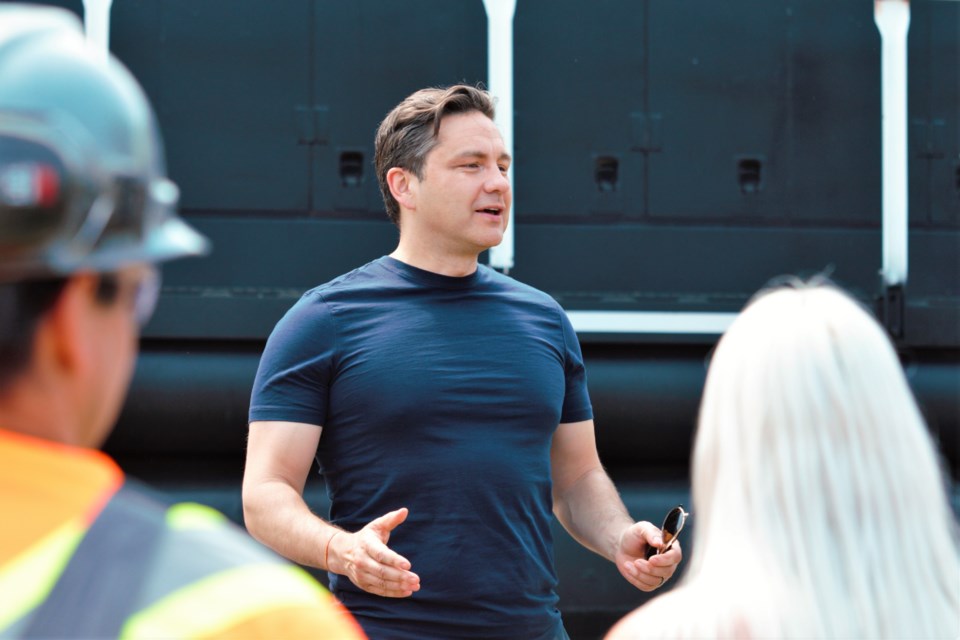THUNDER BAY — Conservative leader Pierre Poilievre painted a bleak picture of Canada under the Trudeau government, while promising tax cuts and action to spur housing builds during a stop in Thunder Bay.
Poilievre spoke to a group of around 30 workers at the G3 Canada elevator on the Mission River on Tuesday.
It was the second day of the Official Opposition leader’s Thunder Bay visit, after addressing supporters on Monday at the Da Vinci Centre.
The visit is part of a swing through Northern Ontario that will also hit Kapuskasing, Sault Ste. Marie, Sudbury, and North Bay.
Poilievre, elected last fall as leader of the Conservative Party of Canada, painted a grim picture of Canada under the Trudeau government.
“After eight years of Trudeau, everything costs more, work doesn’t pay, housing costs have doubled,” he said. “Crime, chaos, drugs, and disorder are common in our streets.”
By contrast, Poilievre pledged to “bring home the Canada that we know and love.”
Asked about his top priorities if elected, Poilievre listed repealing the carbon tax, tying federal infrastructure funding for cities to their success in approving new housing builds, and lowering income taxes.
“We should make this the fastest place in the world to get a building permit,” he said. “I’m saying to the big cities, they have to boost building permits by 15 per cent per year, or they will lose federal grants. Those that exceed that 15 per cent target will get a bonus.”
He also highlighted a plan to sell off 6,000 federal buildings and thousands of acres of federal lands to the private sector.
Poilievre also emphasized the need to spur resource extraction, saying the federal government could do more to encourage development in the Ring of Fire, for example.
If elected, he has pledged to repeal Bill C-69, the Impact Assessment Act, which strengthened some requirements like climate impact assessments for new infrastructure projects.
“Right now it takes about 25 years to get a mine approved in Canada, and that’s because of duplicative, repetitious red tape that makes it impossible to get a decision,” Poilievre said.
By contrast, he said investors “can bring their money to other countries and get their mines started in a few months.”
Asked how he would address concerns from First Nations who are calling for greater control over development on their traditional lands, Poilievre responded simply that “a lot of First Nations do want development.”
“It’s an opportunity for their young people to get powerful paychecks in the licensed trades as electricians, pipe-fitters, that brings money for water treatment, health care, and education in First Nations communities,” he said.
Poilievre leaned heavily on a promise to repeal the federal carbon tax in his remarks.
The tax applies in provinces and territories, like Ontario, that don't have their own carbon pricing systems.
The federal government estimates that 80 per cent of Canadian households get more money back in rebates through the Climate Action Incentive than they pay in carbon taxes.
The Conservative leader also argued those struggling with addiction need access to “treatment and recovery, rather than tax-funded opioids,” referring to safe supply programs that have won federal approval in cities including Thunder Bay.
Poilievre’s opposition to those kinds of harm reduction services puts him out of step with a growing consensus locally, with leaders across Thunder Bay’s health system, municipal government, and police force expressing support for safe supply and decriminalization.
Poilievre expressed optimism the Conservatives could break through in Thunder Bay in future elections, after being shut out locally for decades.
“Other than [Conservative Kenora MP] Eric Melillo, I feel like the North has been forgotten by the federal government,” he said. “Justin Trudeau spends a lot of time trying to win big-city votes, bringing in high carbon taxes on the fuel and food of northern people, he’s banning hunting rifles, and he’s attacking resource sectors that create jobs in communities like this one.”
